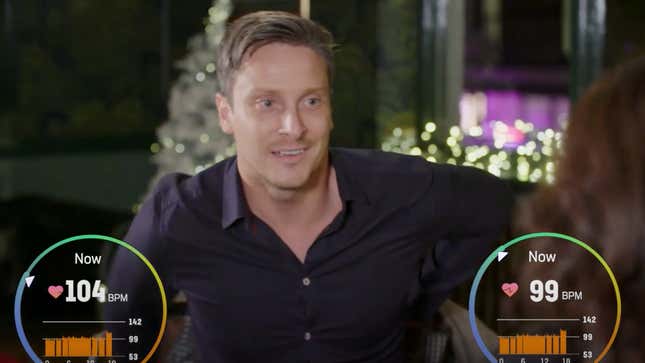
To a certain degree, using smartwatches and fitness trackers to quantify the body’s response to external factors makes a lot of sense. For instance, researchers are studying to see if wearables can identify infectious diseases, and on a more personal level, you can measure the effects of your own fitness routine. But, uh, we don’t need to use smartwatches to quantify dating of all things.
Zepp, a relative newcomer to the smartwatch scene, just released a “reality web film” for Christmas titled Measurements of Attraction. My soul is withering into a pile of dust as I write this, but the basic premise is that Michelle, a woman who, in her own words, has a train wreck of a dating history but doesn’t want to be a spinster cat lady, wants a boyfriend for Christmas. Except this time, she and her blind date wear Zepp E smartwatches to track their heart rates during their date to “see if they’re a match.” The roughly 3-minute video is what you’d expect from a marketing version of The Bachelor or some other type of dating reality show, but if you shoehorned a tech element in.
The video is chock full of cringe—which, hey, some masochists might enjoy—but say, as a mental exercise, we were to take this seriously. Zepp’s press release notes that the company consulted with medical and psychological experts to help figure out “moments of genuine attraction based on telltale body reactions that people can use as a personal checklist even when socially distanced.” Supposedly, a bpm of 100, or an increase of 10 bpm compared to your resting heart rate, might indicate you’re into someone.
Now, I’m no scientist but I have been on my fair share of terrible Tinder and OkCupid dates. Let it be known at that no point during my year of online dating hell did I ever think, “Hmm, I just can’t tell if I’m vibing with this person. Maybe I should whip out my smartwatch and check my heart rate to see if I can quantitatively determine if I would like to bone the person sitting across from me.”
Also, as a side note, plenty of things can make your heart race: your anxiety at figuring out how to ditch a self-obsessed lame-o at a bar without coming off as too rude or the panic as someone you do not want to kiss goes in for the kiss and you have to turn it last-minute into an awkward handshake.
Somewhat confusingly, Zepp notes that there are other body signals that might indicate attraction, such as your pupil size dilating to more than 4mm or blinking more than 12 times per minute. Also included were flushed cheeks, sweaty palms, changing vocal tone, and your “gaze go[ing] in a triangular formation from eye to eye to below the chin. Or, you know, things you can’t measure with a smartwatch—stereotypical markers you’ve probably already read about in sappy poems and trashy romance novels.
However, the most cringey part of the video comes at the end, when Zepp acknowledges in a long block of text: “The Zepp product can test your heartbeat but cannot determine your decisions. However, staying healthy can help you feel better and more attractive.”
I begrudgingly applaud the gymnastics used to try and link this marketing schlock to an actual reason why you might want a smartwatch, but at the same time, watching it has severely degraded my mental health.
Look, technology and gadgets already play an outsized role in making dating miserable. Waiting for texts, getting ghosted, unsolicited dick pics, agonizing over whether it’s appropriate to send a peach or eggplant emoji, feeling weird when that crappy date finds you on Instagram and stalks your Stories—it’s already a nightmare. What’s next? Recording your “date” as a workout so you can review your heart rate chart afterward? Please. Ain’t nobody got time for that nonsense. The only role a smartwatch should play with regard to romance is as a harbinger of text notifications. Maybe if you’re truly brave, you could dictate a text response to Siri or Google Assistant to your crush via your wrist.
I’m not saying that society won’t evolve to use smartwatches in weird ways when it comes to relationships and romance. My husband once ended a relationship with an ex because he found out they were cheating when racy texts from someone else showed up on their Apple Watch. On one date, I had to politely decline friending that person on Fitbit. But unlike detecting atrial fibrillation or dangerously abnormal heart rates, there’s no reason we should try using technology to quantify whether someone’s physical cues mean they like you. It is bad enough when a date asks for your birth time so they can look up your compatibility in Co-Star (a thing that actually happened to me). If you’re weirdly staring at someone, counting how many times they blink per minute, or god forbid ask them to hold open their eyes while you try to measure their pupil dilation, I am going to say with 98% certainty that you have just convinced your date to not see you again.
Sometimes you don’t need technology. In this case, the only thing I can say is if the date is going well, you won’t be looking at your smartwatch.